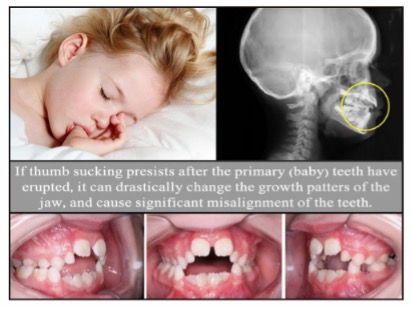February is widely regarded as Children’s Dental Health Month. This is important because the proper information can save resources and more importantly save a life.
In this issue, we will discuss the effects of finger and thumb sucking in children.
Thumb sucking or finger sucking and pacifier use, is perfectly acceptable for infants. According to the American Dental Association, this is a natural reflex for an infant that can often be seen in the womb during development. This reflex gives your baby comfort and, as he grows, it may help him feel secure and happy. It can also be soothing, and many babies and toddlers use it as a coping mechanism when anxious or separated from their parents. The habit helps to induce sleep, and children may suck their thumbs in the evening before bedtime.
From infancy, children use sucking behaviors to calm themselves. In fact, plenty of parents rely on pacifiers, teething toys, and other items designed for children to suck on in order to encourage emotional regulation in their children.
Thumb sucking sometimes occur in older children. According to the ADA, the best time to discourage thumb sucking is by age four. By this time, prolonged sucking could begin to affect your child’s mouth and developing jaw and teeth, possibly causing permanent teeth to be misaligned. As children get older, they may develop the habit of finger or thumb sucking. Unfortunately, thumb sucking can have long-lasting negative side effects if the habit last past age four. Some side effects of prolonged or intense thumb sucking include the following:
-
Open Bite
The most serious side effects of thumb sucking are types of dental malocclusion. Malocclusion is a general term that describes tooth misalignment that is visible when the mouth is closed. The most common types of malocclusions caused by thumb sucking are open bite and overbite.
Open bite occurs when the top and bottom front teeth become directed outward. This means that the front teeth do not touch when your child’s teeth are completely closed. Open bite may require braces correction.
-
Overbite
Like open bite malocclusion, overbite occurs when the upper teeth become directed outward. In an overbite configuration, however this misalignment is confined to the upper front teeth. This means that the top teeth cover the bottom teeth when your child’s mouth is closed rather than the top and bottom teeth touching normally.
3. Skin Problems on their thumb/finger
Children who suck their thumbs over the course of years may experience uncomfortable or serious skin problems on their finger. When exposed to the moisture of the mouth, the skin can become vulnerable to other injuries. In some cases, the skin crack or bleed, making your child’s hands vulnerable to infection.
4. Speech Impediment
Because thumb sucking affects the development of the teeth, jaw and palate, the habit can also change how your child eats and speaks. Thumb sucking may cause lisping and other speech impediments, including an inability to pronounce hard consonant sounds like “D” and “T.”
Speech impediments may make it more difficult for your child to communicate effectively. Many children with speech impediments also experience high levels of frustration, anger, and feelings of isolation.
5. Social Issues
Even before your child’s thumb sucking becomes a real and present threat to your child’s dental development, the habit may cause social issues. Children who suck their thumbs in public may be teased by their peers. While thumb sucking may be a normal reflex childhood habit, the older your child gets, the more other people may judge him or her for continuing the habit.
Since thumb sucking is a subconscious response to stress or boredom so many children need support and instruction to overcome the habit within the appropriate developmental stage. Your child may need your help and the help of a dentist to break the habit. However, eliminating thumb sucking behavior is a goal that you can work toward over time and one that should be achieved through positive reinforcement rather than punishment.
For further information and similar articles, kindly visit our website at www. csddentistry.com
Dr. Kendal V. O. Major is Founder and CEO of Center for Specialized Dentistry which is a comprehensive family dental practice operating in Nassau and Freeport. He is the first Bahamian Specialist in gum diseases and dental implants since 1989. He also is a certified Fast braces provider. His practice is located at 89 Collins Avenue, Nassau at (242)325-5165 or [email protected]







